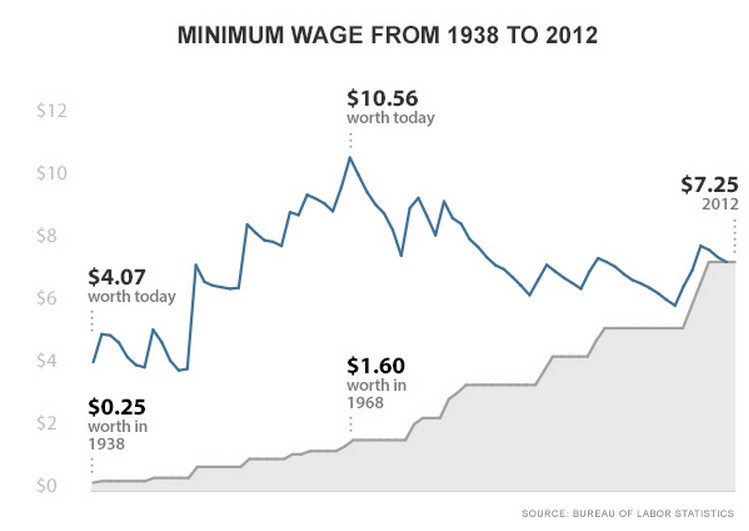$15,080. Enough money for a fancy vacation, enough money for a new car, enough money for a year of tuition at BSM, but not enough money to live for a year. Yet, many Americans find themselves making this amount, and even less, although they have a full time job. Someone working 40 hours a week should not be below the poverty line and should be able to support their family single-handedly. This is why President Obama’s plan to increase minimum wage to $9 must be taken seriously.
The current minimum wage is outdated, to say the least. In 1938, when the concept of a minimum wage began, workers had to make at least 25 cents per hour. That would be around $4.10 today. However, based on the 1968 minimum wage of $1.60, the salary when adjusted for inflation would be $10.25––much higher than the current rate of $7.25. By increasing wages up to even $9 an hour, workers would receive $3,640 more in a year, making a world of difference. Even paying for simple necessities, like groceries or gas, would become much less of a burden.
When compared to other advanced nations, the United States is far behind in paying its workers. The U.S. rates are closer to the rates of Slovenia than those of the United Kingdom. If the United States wants to remain a competitive nation, we must adjust our workforce’s wages. Without change, the income disparity accompanied by the low minimum wage will further detriment the economy, and affect the US’ standing in the global market.
Some argue against this increase in wages, claiming that businesses will not be able to afford to pay their employees at higher levels and will be forced to fire many workers. However, this belief is unfounded. According to John Cassidy for The New Yorker: “There is no obvious link between the minimum wage and the unemployment rate. During the 1960s, when the minimum wage was raised sharply, unemployment rates were sharply lower than they were in the 1980s, when the real value of the minimum wage fell dramatically.”
Instead, raising the minimum wage would be beneficial to the economy. According to Doug Hall of the Economic Policy Institute, a minimum wage hike to $9 would pump $21 billion into the economy through increased consumer spending. By taking the money out of the hands of corporations and giving it to the people in higher wages, spending improves and the economy is stimulated.
In addition, the notion that raising the minimum wage will cause companies to outsource jobs is without merit. According to Robert Reich, former US Secretary of Labor, in the San Francisco Chronicle, “employers won’t outsource the jobs abroad or substitute machines for them because jobs at this low level of pay are all in the local personal-service sector (retail, restaurant, hotel and so on), where employers pass on small wage hikes to customers as pennies more on their bills.”
The United States must also look at the minimum wage debate from a moral perspective. Is it acceptable for someone to work full-time and still struggle to provide for their family? At a recent Minnesota House Committee hearing on the topic, Jessica English, a 34-year old homeless mother of four, testified that despite working minimum wage for 15 years, “If I continue to work for these wages, there is no end in sight, I work. I go to school. When am I supposed to have time for my kids?”
Income disparity is not an acceptable evil. President Obama’s plan to raise the minimum wage would be a simple and effective solution that would benefit not only the paychecks of employees, but the economy as a whole. In addition, the country has a moral obligation to care for and ensure the safety of every American citizen. It is immoral to allow our hard workers to suffer.






































![Teacher Lore: Mr. Hillman [Podcast]](https://bsmknighterrant.org/wp-content/uploads/2025/03/teacherlorelogo-1200x685.png)





Betty Haney • Mar 13, 2013 at 4:54 pm
Dear Ms. Karels,
It seems that you are unconcerned for those in your demographic – i.e. high school students, who, along with college students, have suffered gravely under this administration’s depiction of the unemployment numbers. Your age group is mounting 20% unemployment and higher, which you can discover by asking your peers how easy it was for them to find a job, an whether they actually have a job.
If we are to raise the minimum wage, then why $9.00? If, as you state in your article, the purpose is to bring a living wage to workers, then why not $20.00? And if $20.00 per hour would be good, then $40.00 per hour would be better, and closer to what a family needs to live on. And just imagine how few teenagers and college students, not to mention uneducated workers, will be unemployable at those hourly wages! So if the argument for $9.00 is to keep it in perspective, then why not $8.00? so you see, we just end up back at the philosophical starting point – either the government should decide what wages should be paid, or it shouldn’t. I know any number of bright, hard-working BSM students who are capable of handling difficult tasks who could easily be employed if the market were allowed to decide who they want to hire, and at what salary. Now, in an economy like the current one, where the business community is timid to employ because of uncertainty about government policies, many will suffer. But not more than the uncounted unemployed.
We must verify unemployment numbers, especially as they pertain to various groups in the population, before we jump on board with whats sounds nice, and easy. The easy fix, as we have learned in the last few years, is rarely the best one.
So the argument ends